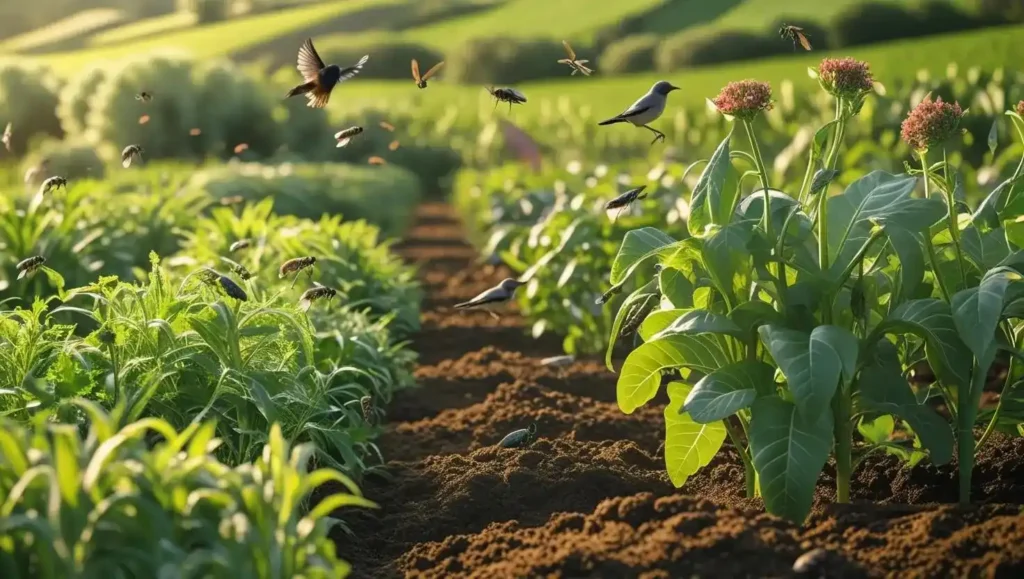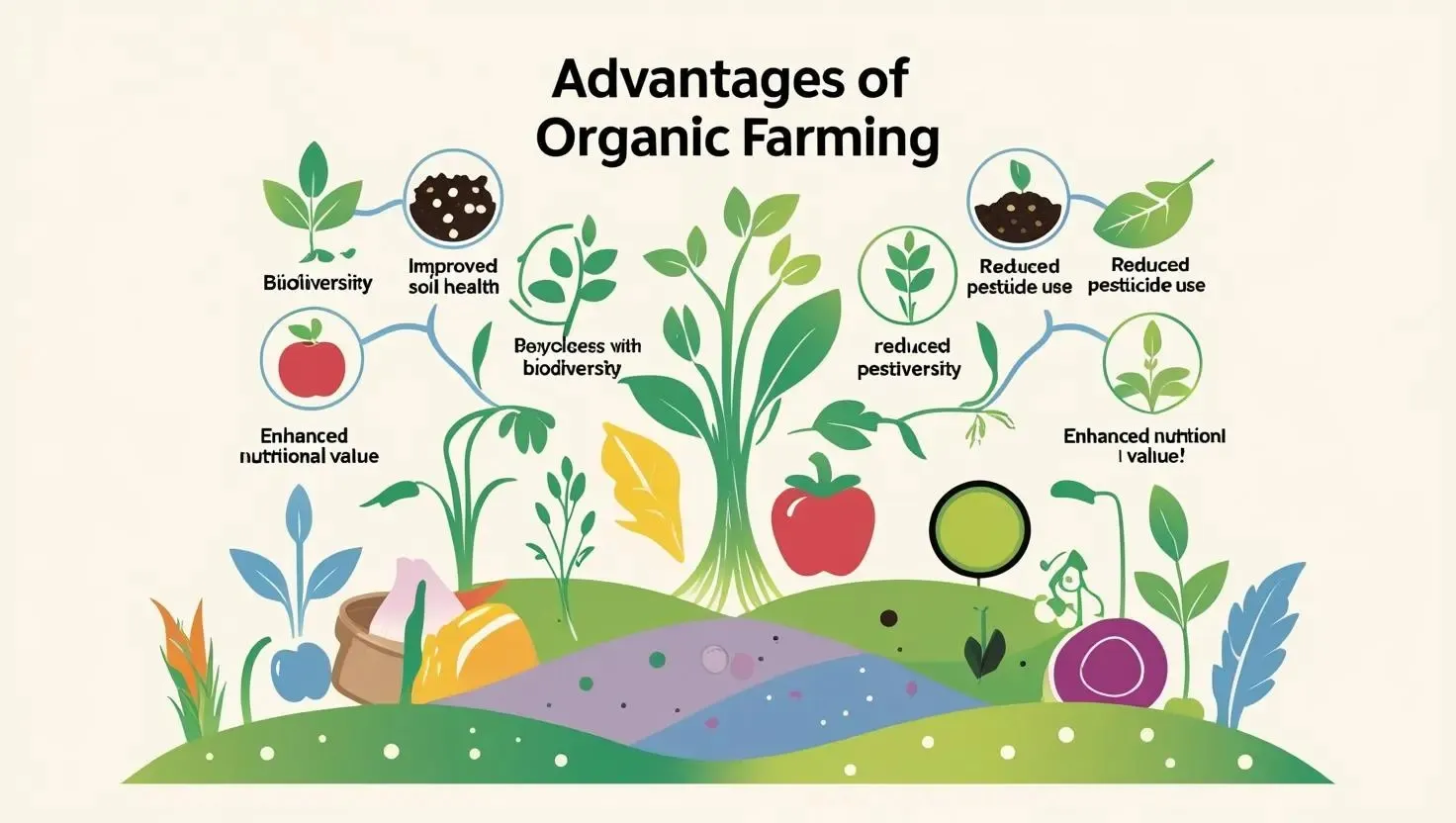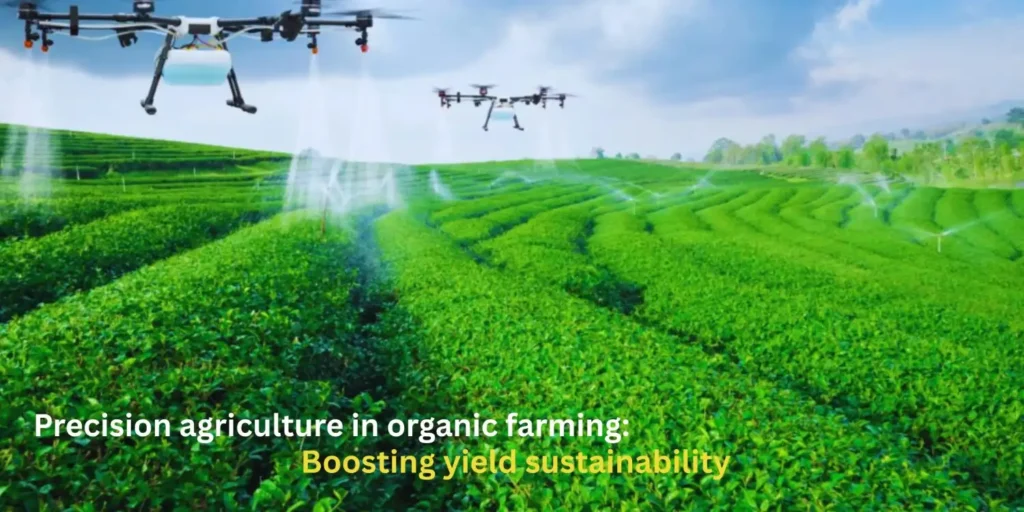Organic farming can be seen as an approach or a unique system of farming that adopts modernized technicalities of cultivating the land without disturbing the natural process or disrupting the soil health of the ecological process, without contributing to climate change.
The primary use of bio-fertilizers and pesticides, which are acquired through animal or plant waste. advantages of Organic farming balances the ecosystem and reduces the impact of chemical fertilizers and greenhouse gas emissions; rather, it improves, maintains, and repairs the ecosystem.
They are referred to as systematic farming, which utilizes green manure, cow dung, etc, for cultivation. Organic farming works to optimize the green world of vegetation and cropping systems. They aim at improving the environment and managing the health of the ecosystem rather than degrading it.
ADVANTAGES OF ORGANIC FARMING:
Organic farming covers almost 74 million hectares of land worldwide. This depicts how crucial and popular organic farming is today. The consumerist society has become more health-conscious and vigilant about the benefits of organic farming.
prohibits the utilization of harmful chemicals: Organic farming prohibits the utilization of any form of harmful chemicals, like fertilizers, pesticides, or any form of sprays, to protect the crops.
Maintain soil health: It improves soil fertility by protecting the topmost layer of soil from erosion, which is harmed by excessive use of fertilizers.
Nutritionally richer than conventional agriculture: The organic food produced is much more nutritious as compared to the traditional method of farming. It is very value-oriented and scrumptious.
They are viable and economical: In organic practices, no expensive fertilizers or pesticides are used, and it’s a chemical-free farming method. Where HYV seeds are being used for agricultural practices.
It sustains biodiversity: It supports a wide range of plants and animals, which may lead to a more firm agricultural system
Sustainable periphery: It helps in reducing pollution and environmental effects on the crop yield and lowers the carbon footprint.
you can also read this: Organic Farming Vs Conventional Farming: Key Differences and Pros & Cons
ORGANIC FARMING IMPACTS SOIL HEALTH
It has a direct impact on soil productivity, and soil plays a pivotal role in organic farming. It impacts crop productivity and the sustainable character of farming techniques.
Soil plays a pivotal role in determining the organic character of the produce, as it can hold more air and water. The organic produce higher yields and aim at maintaining soil fertility; the organic constituents aim to protect the topmost layer of soil and maintain biological health.
Green manure helps in building good soil quality, emphasizing in maintenance of the innate qualities of the soil components. The organic farms hold higher organic matter levels, which improve water retention.
ORGANIC FARMING RELATION WITH BIODIVERSITY

The organic benefits of the ever-increasing population. Organic farming benefits the soil health and the aquatic life system. It reverses the trend of agricultural activity. There is a scientific study that showcases the evidence that doing organic farming in the lowlands supports a higher degree of biodiversity than the traditional form of farming.
Organic farming is a holistic approach and production management system that replenishes the agri-business condition by utilizing the knowledge of traditional and modern scientific knowledge.
The organic agriculture system entirely relies on ecosystem balancing rather than external conditioning.
Biodiversity is the inclusion of life on Earth. It is the basis for all ecosystems, from the food we intake to the ecosystem cycle, which depends on the process of production.
The valuable research has been conducted on the connectivity of biodiversity in the realm of organic farming. It has the potential to influence biodiversity conservation, enhancing the wild species found on the agricultural land.
Saving and conserving our soil health and soil flora and fauna is the utmost criterion, like earthworms, enhancing and implementing carbon sequestration, to reduce global warming and greenhouse gas emissions.
BENEFITS OF ORGANIC FARMING:
1. Use of bio-fertilizers for green farming practices
2. It is considered an eco-friendly system of agriculture
3. It supports and maintains the soil health
4. It replenishes biodiversity and the ecosystem
5. It helps in mitigating the climate change condition
ANALYSE ECOSYSTEM SERVICES:
The ecosystem services are the useful benefits that human beings derive from the ecosystem, which encompass provisioning, cultural, and supporting services. Ecosystem services encompass pollination by bees, water purification by wetlands, and carbon sequestration by plants and forest trees.
These are of cardinal usefulness for human beings for their well-being and economic prosperity. It highlights the importance of conserving and sustainable management systems of the ecosystem.
It thrived on the belief system that the natural ecosystem rests on the belief to do good for mankind while encapsulating the ideology of food, water, and raw materials. Like climate management, water conservation, pest control, supporting and managing soil formulation, and enhancing the cultural realm, including spiritual enrichment and cultural heritage preservation. They are formulated for human welfare and development.
CONCLUSION
Organic farming upholds the principle and the potential to revamp and revolutionize the rural community by creating a sustainable environment, livelihood, and restoring the local food chain. By adhering to the doctrine of organic farming, the rural areas can become self-sufficient. They can grow stronger and more resilient.
The focus of organic farming remains on soil health; it judiciously uses green manure, cow dung, and cover crops, reducing the need for water.
Ecosystem services are undauntedly important in supporting life on Earth. They provide us with essential resources like food, water, and medicines, and regulate the climate.



